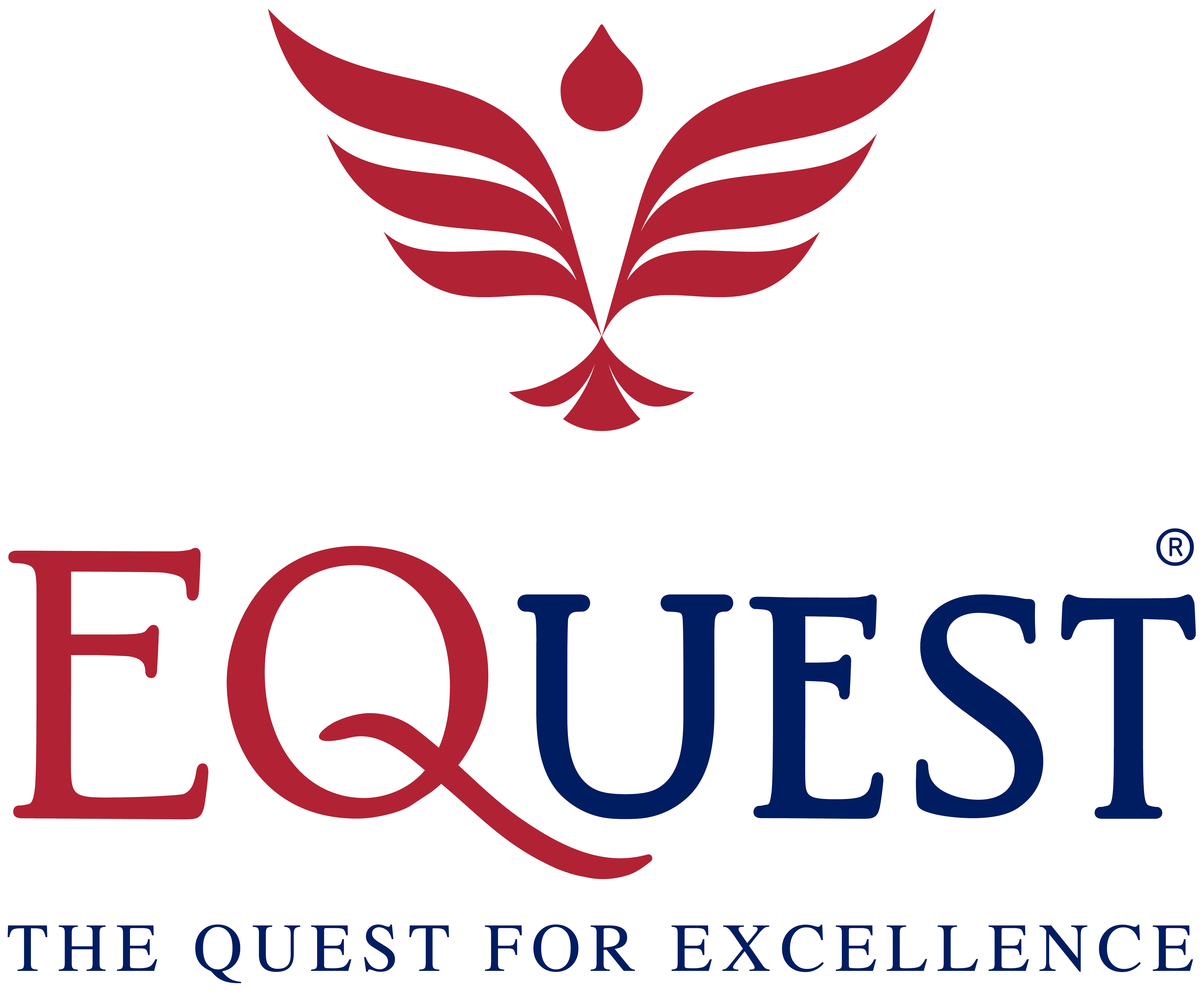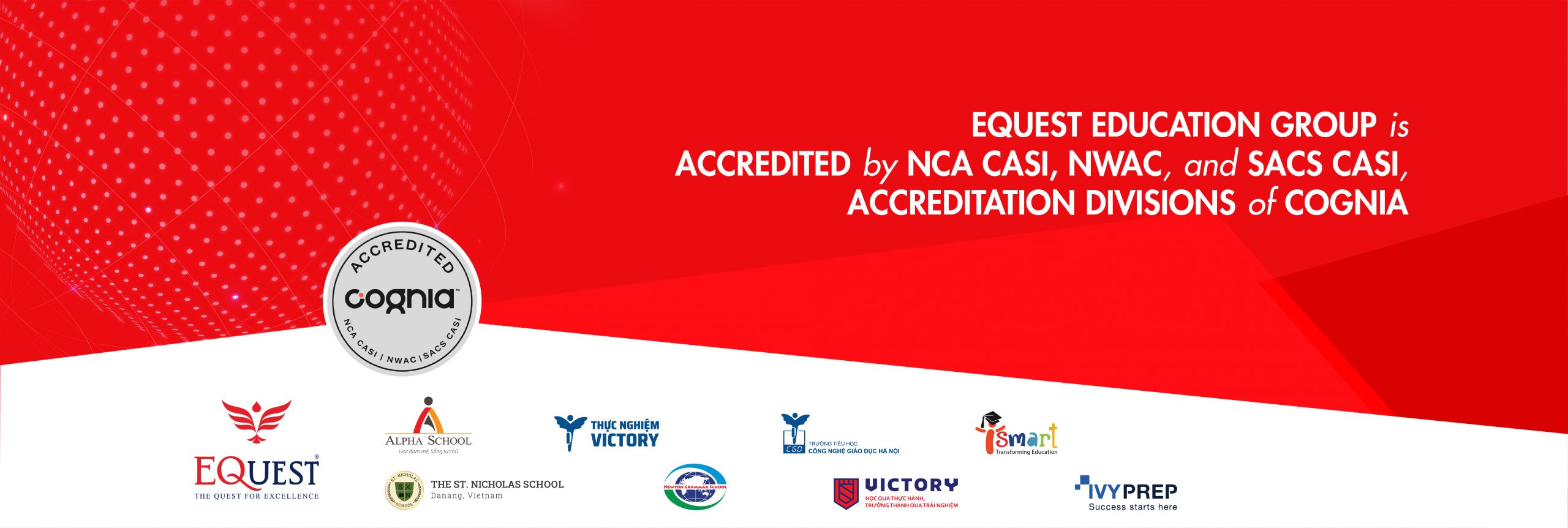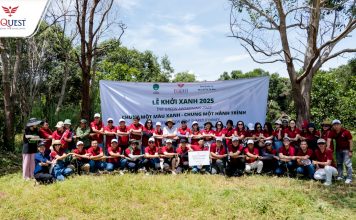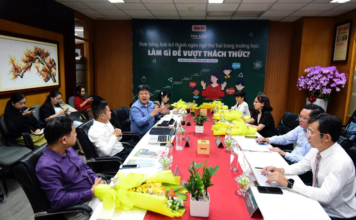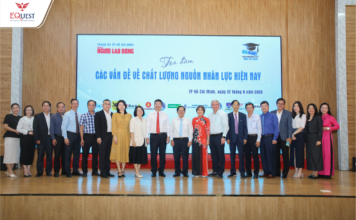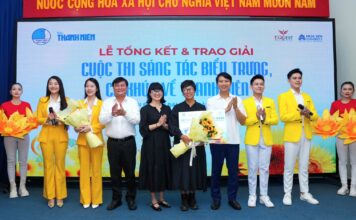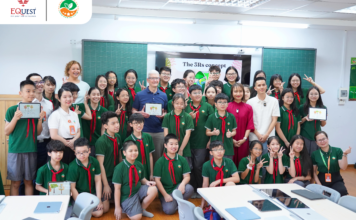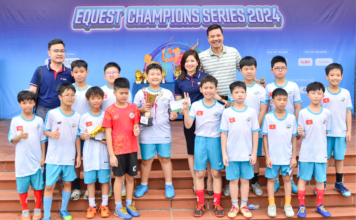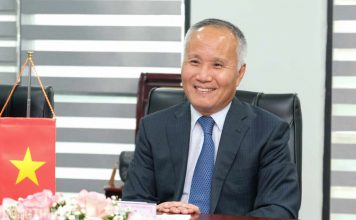[25/07/2022] – Today, EQuest Education Group (EQuest) officially announced: After a year of implementing rigorous requirements from the Cognia Accreditation Organization (USA), EQuest Education Group and other member units of the K12 Division, as well as Educational Technology and ESL Division are accredited by NCA CASI, NWAC, and SACS CASI, accreditation divisions of Cognia.
With this result, EQuest has become the first Vietnamese private educational institution to achieve Cognia accreditation. EQuest member units that have earned Cognia accreditation include Alpha School, Victory Experimental School, Newton Grammar School, Hanoi Primary School for Educational Technology (CGD Hanoi Primary School), The St. Nicholas School, Victory High School (formerly Dong Do High School), iSMART Education (iTD Academy, iTO & 789), and IvyPrep Education.
Ready to Meet International Standards
Cognia is the world’s largest accrediting organization, with 125 years of history and accrediting over 40,000 schools/institutions in 85 countries worldwide. Cognia owns the 3 largest regional accreditation agencies in the US (NCA CASI, NWAC, SACS CASI).
The quality accreditation process by Cognia at each institution/educational unit usually takes place within 1.5 to 2 years and is valid for 5 years. EQuest is among the organizations that have achieved the fastest accreditation time.
Cognia’s accreditation validates EQuest’s and its member units’ ability to meet international standards in all three competencies (Leadership, Teaching & Learning, and Resource Management) and demonstrates a commitment to constantly improving educational quality.
Mark Jonathan Sayer, Executive Vice-Chairman of EQuest’s K12 Division, said: “Achieving this comprehensive education accreditation is such an important milestone for us. I believe that this achievement by EQuest will lead to more schools and universities in Vietnam participating in international accreditation, in turn raising standards and establishing the position of Vietnamese education on a par with other countries in the region and the wider world. EQuest has so much to offer and I both applaud the team and look forward to our progress, to provide our students with outstanding educational opportunities now and exciting possibilities in their lives ahead.”
Mr. Truong Minh Chau, Head of the Accreditation Committee of EQuest, said that Cognia highly appreciates the outstanding strengths of EQuest, which include having a team of leaders with high competence and vision, a culture of shared leadership, an effective strategic plan with clear goals, strong and good technical background, rich data from different sources, and a serious commitment toward continuous improvement.
For schools, Cognia is based on academic performance, progress, and equal learning opportunities in a safe and effective teaching environment, where teachers are professionally trained and have equal opportunities for professional development and career advancement.
Dr. Mark A. Elgart, president and CEO of Cognia, stated, “Cognia Accreditation is a rigorous process that focuses the entire school and its community on the primary goal of preparing lifelong learners in engaging environments where all students can flourish. EQuest Education Group is to be commended for demonstrating that it has met high standards, and is making progress on key indicators that impact student learning.”
Commit to Bringing more Benefits to Learners
Students and parents will be the ones who receive the greatest benefits after EQuest and its member units are internationally accredited.
First, the comprehensiveness of EQuest’s programs and its now internationally recognized transcripts will increase the competitive advantage of students entering the world’s top universities;
Second, accreditation promotes continuous improvement in school programs and activities and personalization in learning to deliver the best educational experiences for students.
Third, students can save billions of VND (tens of thousands of dollars) by studying directly in Vietnam in EQuest’s high-quality education programs sharing the same assessment standards, which are guaranteed to be internationalized as a result of Cognia’s accreditation. In particular, the accreditation process will best evaluate and improve existing bilingual programs.
Dr. Dam Quang Minh, CEO of EQuest’s K12 Division, said that in the near future, EQuest and Cognia will be ready to share their experience in participating in the international education accreditation process with all educational institutions and schools in Vietnam.
More about International Accreditation of Education
International accreditation usually lasts from 1.5 to 2 years with numerous criteria and standards established for evaluation and improvement. During the accreditation process, educational institutions not only complete a comprehensive self-assessment process, demonstrate a level of assurance to meet the set criteria and standards, and build and implement an improvement plan, but are also periodically monitored and evaluated by the accrediting organization during the 5 years of the accreditation’s validity. This exhaustive process upholds EQuest as a legitimate and continuously improving educational institution in the eyes of parents, students, and the general public.
Cognia’s evaluation is based on evidence recorded during operations and by directly interviewing and evaluating an organization’s participants, including students, parents, teachers, staff, and managers.
Cognia certifies the accreditation when the organization/unit meets all 3 groups of competencies: Leadership, Teaching & Learning, and Resource Management.
I/ Evaluating and Improving the Group’s Capacity for Resource Management is Reflected in the Following 8 Criteria:
- The organization plans and delivers professional learning to improve the learning environment and organizational effectiveness.
- The organization’s professional learning structure and expectations promote collaboration and collegiality to improve organizational effectiveness.
- The organization provides induction, mentoring, and coaching programs that ensure all staff members have the knowledge and skills to improve professional practice and organizational effectiveness.
- The organization attracts and retains qualified personnel who support the institution’s purpose and direction.
- The organization integrates digital resources into teaching, learning, and operations to improve professional practices and organizational effectiveness, as well as to support learning and program delivery.
- The organization provides access to information resources and materials to support its organization, programs, and services.
- The organization demonstrates strategic resource management that includes long-range planning and the use of resources in support of the organization’s purpose and direction.
- The organization allocates human, material, and fiscal resources in alignment with the organization’s identified needs and priorities to improve organizational effectiveness.
II/ Evaluating and Improving the Group’s Capacity for Leadership is Reflected in the Following 11 Criteria:
- The organization commits to a purpose statement that defines beliefs about learning, including the expectations for the organization.
- Stakeholders collectively demonstrate actions to ensure the achievement of the organization’s purpose.
- The organization engages in a continuous improvement process that produces evidence thereof, including measurable results of professional practices and organizational effectiveness.
- The governing authority establishes and ensures adherence to policies that are designed to support organizational effectiveness.
- The governing authority adheres to a code of ethics and functions within defined roles and responsibilities.
- Leaders implement staff supervision and evaluation processes to improve professional practice and organizational effectiveness.
- Leaders implement operational processes and procedures to ensure organizational effectiveness.
- Leaders engage stakeholders to support the achievement of the organization’s purpose and direction.
- The organization provides experiences that cultivate and improve leadership effectiveness.
- Leaders collect and analyze a range of feedback data from multiple stakeholder groups to inform decision-making that results in improvement.
- The organization implements a quality assurance process for its institutions to ensure organizational effectiveness and student learning.
III/ Evaluating and Improving the Group’s Capacity for Teaching and Learning is Reflected in the Following 16 Criteria:
- The learning culture promotes creativity, innovation, and collaborative problem-solving.
- The organization identifies and develops programs and services based on a data-driven needs assessment of its institutions.
- The organization implements programs and services that are equitable, relevant, and aligned to research and best practices to meet the needs of its institutions.
- The organization implements instructional strategies that ensure adult learners’ needs are met and that learners are engaged in deeper learning experiences.
- The organization gathers, analyzes, and uses formative and summative data to improve student learning and the delivery of programs and services.
- The organization implements a process to continuously assess its programs, services, and organizational conditions to improve organizational effectiveness.
- Learners have equitable opportunities to develop skills and achieve the content and learning priorities established by the organization.
- The learning culture develops learners’ attitudes, beliefs, and skills needed for success. The organization has a formal structure to ensure learners develop positive relationships with and have adults and peers who support their educational experiences.
- Educators implement a curriculum that is based on high expectations and prepares learners for their next levels.
- The organization implements a process to ensure the curriculum is clearly aligned to standards and best practices.
- Educators implement instructional strategies that ensure learners’ needs are met and that learners are engaged in deeper learning experiences.
- Instruction is monitored and adjusted to meet individual learners’ needs and the organization’s learning expectations.
- The organization provides programs and services for learners’ educational futures and career planning.
- The organization implements processes to identify and address the specialized needs of learners.
- The learning progress is reliably assessed and consistently and clearly communicated.
The media reported: Lao Động, Đảng Cộng sản Việt Nam, Chính phủ, Giáo dục và Thời đại, Người Lao Động, Thông tấn xã Việt Nam, VnExpress, Sài Gòn giải phóng, CafeF, Thương hiệu & Công luận, An ninh thủ đô, Doanh nhân Sài Gòn, Vietnamplus, VNMedia, Edu2Review, Dân Việt, Kênh tuyển sinh, Người đưa tin, VTV, Vietnam Business Insider, Đầu tư, Việt giải trí, Doanh nghiệp cuộc sống, Nhà đầu tư, Sở hữu trí tuệ
